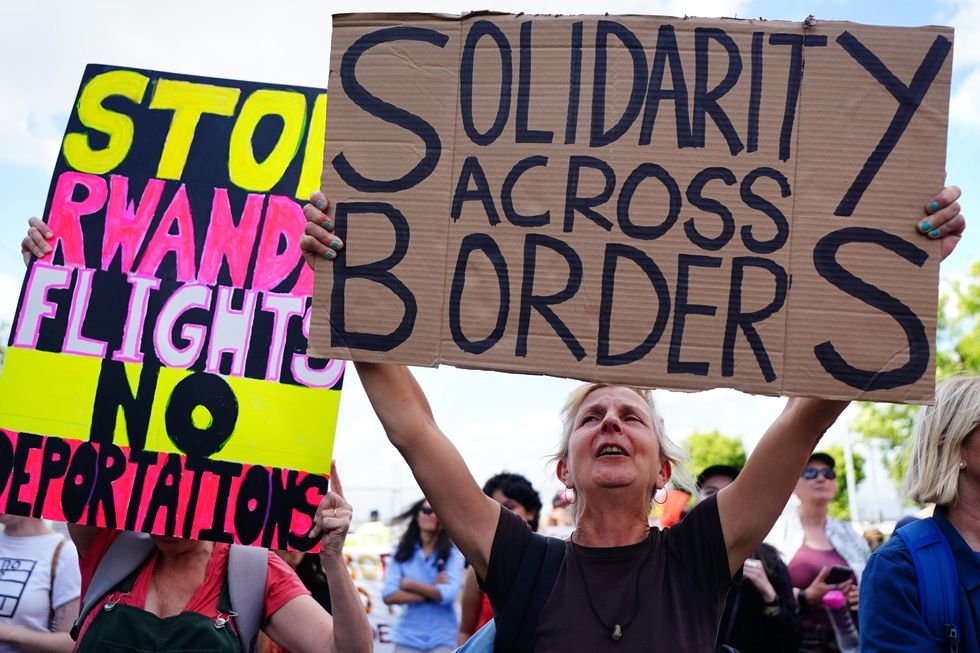Don't Miss
Most Read
Trending on GB News
Last night, the European Court of Human Rights (ECHR) launched a last-minute intervention to halt the flight carrying seven migrants to Rwanda.
There has been much dismay over how the Court has been able to override the rulings of the British High Court, Court of Appeals and Supreme Court.
The authority of the ECHR to intervene in this case is based on the UK’s membership of the Council of Europe (CoE).
The CoE is an organisation which aims to uphold human rights throughout its member states. It is distinct from the European Union as it is solely based on protecting human rights.
For example, Turkey and Monaco are members of the CoE without being members of the European Union, as the UK is.
Membership of the CoE means the countries are subject to the authority of the ECHR. The ECHR rules on potential violations of the European Convention on Human Rights.
The plane that was scheduled to leave for Rwanda
Andrew Matthews
Individuals can make applications to the ECHR which, if successful, would override the rulings of the state in which they are residing. In this case, an Iraqi national made an application to the ECHR for them to indicate an urgent interim measure.
Interim measures are an order from the ECHR to delay the implementation of a policy or decision in their member states. They are normally issued in cases of expulsion or deportation.
In the Rules of Court for the ECHR, it is written that "interim measures are only applied in exceptional cases.
"The court will only issue an interim measure against a Member State where, having reviewed all the relevant information, it considers that the applicant faces a real risk of serious, irreversible harm if the measure is not applied."
In this case, the ECHR has indicated to the UK government in a press release that the Iraqi national should not be removed to Rwanda until "three weeks after the delivery of the final domestic decision in his ongoing judicial review proceedings".
Demonstrators at a removal centre at Gatwick protest against plans to send migrants to Rwanda
Victoria Jones
The press release also lays out their reasoning. They contend , in line with the view of the United Nations High Commissioner for Refugees, "that asylum-seekers transferred from the United Kingdom to Rwanda will not have access to fair and efficient procedures for the determination of refugee status".
Additionally, they argue that "the finding by the High Court that the question whether the decision to treat Rwanda as a safe third country was irrational or based on insufficient enquiry gave rise to ‘serious triable issues’".
As such, the ECHR concluded that there was a "resulting risk of treatment contrary to the applicant’s Convention rights".
The court also highlighted that Rwanda is not a part of the European Convention on Human Rights, casting further uncertainty over the fate of the migrants once deported.
The European Convention on Human Rights is enshrined in the Human Rights Act of 1998. This means that the articles of the convention are enforceable in British courts.
Interim measures have been issued before in cases pertaining to deportation and removal. In September 2010, the ECHR indicated an interim measure to the French government in the case of Y.P. and L.P. v France.
The applicant was a former Belarusian resident who had applied to asylum in France following repeated persecution and targeted violence due to his opposition to the leading regime.
The French Office for the Protection of Refugees and Stateless Persons (OFPRA) rejected their request. Y.P. then applied to the ECHR arguing that returning to Belarus would lead to significant harm being inflicted on him and his family.
This led to an interim measure being issued which delayed the deportation until legal proceedings in the ECHR itself were completed.
Eventually the applicant was allowed to remain due to the judgement made by the court that the deportation would contravene article 3 of the European Convention on Human Rights.
This article enshrines the protection of individuals from torture or degrading punishment.












